Access arrangements for GCSE, AS and A Level: 2021 to 2022 academic year
Published 10 November 2022
Applies to England
This release provides information on the number of access arrangements approved for GCSE, AS and A level in England during the 2021 to 2022 academic year, and the number of requests for modified papers for the 2022 summer series.
1. Main trends
The main trends in access arrangements for GCSE, AS and A level for the 2021 to 2022 academic year in England were:
-
There were 512,085 approved access arrangements, up by 14.4% compared to the 2020 to 2021 academic year. This is a continuation of the upward trend seen before the 2020 to 2021 academic year. In the 2020 to 2021 academic year the decision to cancel the summer exams and to instead award teacher assessed grades (TAGs) was announced before the deadline for submitting applications for access arrangements. Please note that more than one type of access arrangement can be granted per candidate.
-
5,485 centres (92.9% of all centres) had approved access arrangements for one or more of their candidates this year, compared to 5,175 centres (88.2% of all centres) in the 2020 to 2021 academic year.
-
Among the types of access arrangements approved, arrangements for 25% extra time made up 65.3% of all approved arrangements in the 2021 to 2022 academic year, compared to 65.8% in the 2020 to 2021 academic year.
-
There were 61,125 requests for modified papers this year, up 4.9% on summer 2019. We compare the numbers against summer 2019 since no GCSE, AS and A level exams took place in summer 2020 and 2021 due to the coronavirus (COVID-19) pandemic and therefore data on modified papers was not collected.
2. Total number of approved access arrangements
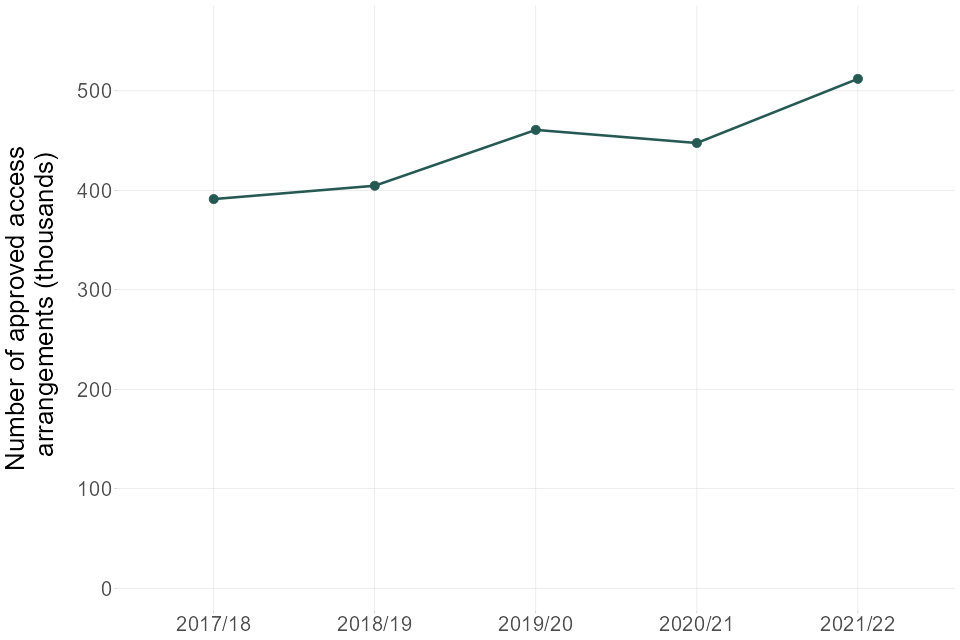
| 2017 to 2018 | 2018 to 2019 | 2019 to 2020 | 2020 to 2021 | 2021 to 2022 |
|---|---|---|---|---|
| 391,185 | 404,600 | 460,750 | 447,555 | 512,085 |
There were 512,085 approved access arrangements in the 2021 to 2022 academic year. The number went up by 14.4% compared to the 2020 to 2021 academic year, continuing the upward trend seen before the 2020 to 2021 academic year. In the 2020 to 2021 academic year the summer exams were cancelled, and the decision to do so and instead award TAGs was announced before the deadline for submitting applications for access arrangements for the 2020 to 2021 academic year. The 2020 to 2021 academic year figures would likely have been higher if the summer exams had gone ahead.
5,485 centres (92.9% of all centres) had approved access arrangements for one or more of their candidates this year, compared to 5,175 centres (88.2% of all centres) in the 2020 to 2021 academic year.
3. Most common types of access arrangements
3.1 Access arrangements changes over time
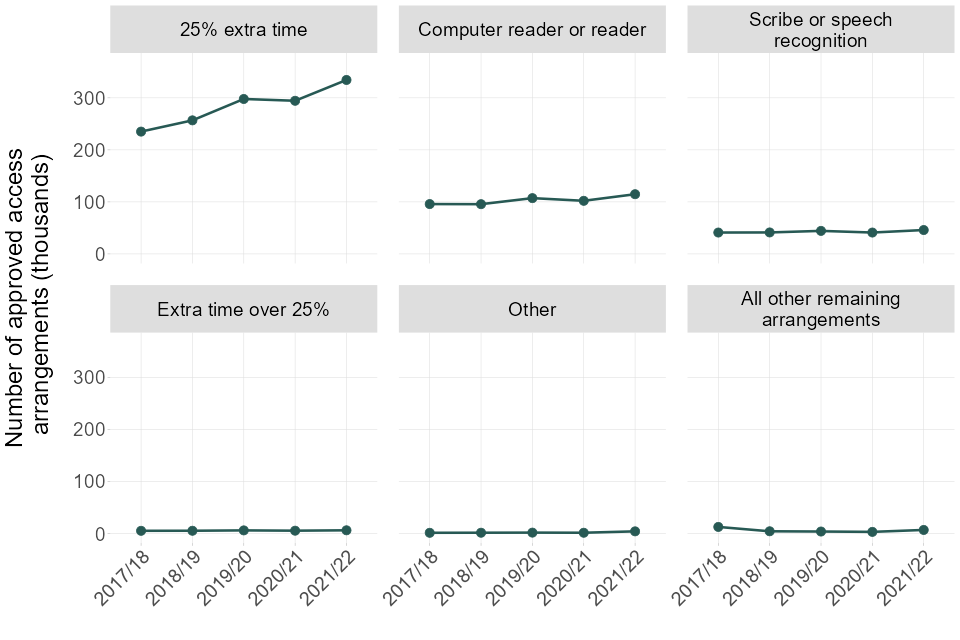
| Access Arrangement | 2017 to 2018 | 2018 to 2019 | 2019 to 2020 | 2020 to 2021 | 2021 to 2022 |
|---|---|---|---|---|---|
| 25% extra time | 235,105 | 256,710 | 297,810 | 294,370 | 334,375 |
| Computer reader or reader | 95,795 | 95,570 | 107,205 | 102,090 | 114,725 |
| Scribe or speech recognition | 41,075 | 41,255 | 44,255 | 41,070 | 45,895 |
| Extra time over 25% | 5,190 | 5,300 | 5,975 | 5,420 | 6,135 |
| Other | 1,370 | 1,515 | 1,710 | 1,475 | 4,120 |
| All other remaining arrangements | 12,650 | 4,250 | 3,795 | 3,135 | 6,840 |
| Total | 391,185 | 404,600 | 460,750 | 447,555 | 512,085 |
Here we report the top five most common types of access arrangements approved in the 2021 to 2022 academic year which were granted through JCQ’s Access Arrangements Online system (detailed in JCQ’s guidelines).
Please note that the ‘Other’ is an access arrangement type that centres may choose when processing their applications using Access Arrangements Online. ‘All other remaining arrangements’ are access arrangement types that were not included in the top five most common types. A further breakdown of ‘All other remaining arrangements’ is given in the data tables.
The most common access arrangements were: 25% extra time, computer reader or reader, and scribe or speech recognition.
Approvals for all the most common types of approved access arrangements increased in the 2021 to 2022 academic year, compared to the 2020 to 2021 academic year.
3.2 Proportions of all approved access arrangements
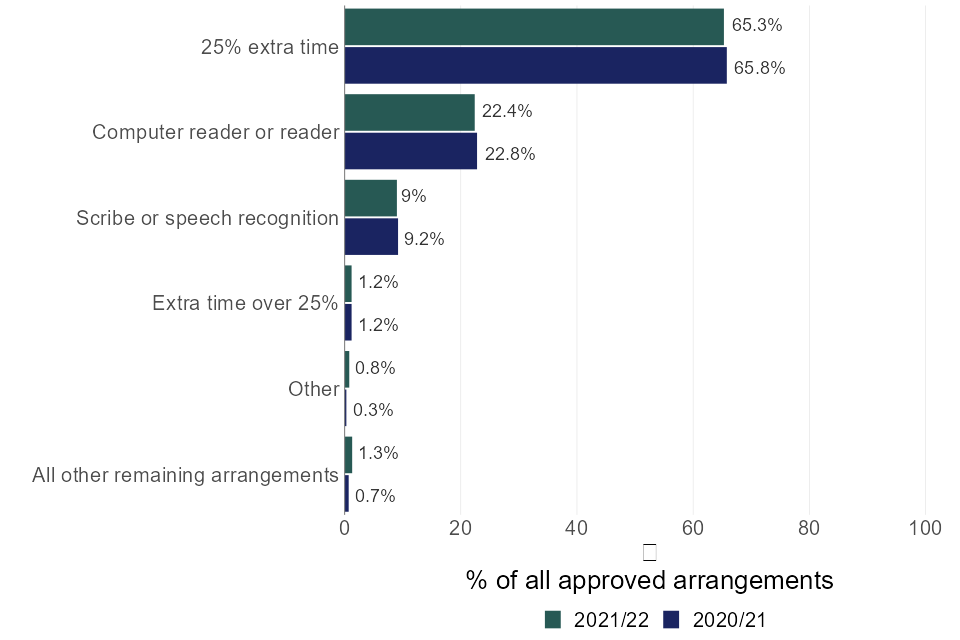
| Access arrangement | % of all approved arrangements in 2020 to 2021 | % of all approved arrangements in 2021 to 2022 |
|---|---|---|
| 25% extra time | 65.8% | 65.3% |
| Computer reader or reader | 22.8% | 22.4% |
| Scribe or speech recognition | 9.2% | 9.0% |
| Extra time over 25% | 1.2% | 1.2% |
| Other | 0.3% | 0.8% |
| All other remaining arrangements | 0.7% | 1.3% |
25% extra time access arrangements made up 65.3% of all approved access arrangements in the 2021 to 2022 academic year, compared to 65.8% in the 2020 to 2021 academic year.
Computer reader or reader access arrangements made up 22.4% of all approved access arrangements in the 2021 to 2022 academic year, compared to 22.8% in the 2020 to 2021 academic year.
Scribe or speech recognition access arrangements made up 9.0% of all approved access arrangements in the 2021 to 2022 academic year, compared to 9.2% in the 2020 to 2021 academic year.
Further information on all arrangements is given in the data tables.
3.3 Approved access arrangements as a proportion of candidates
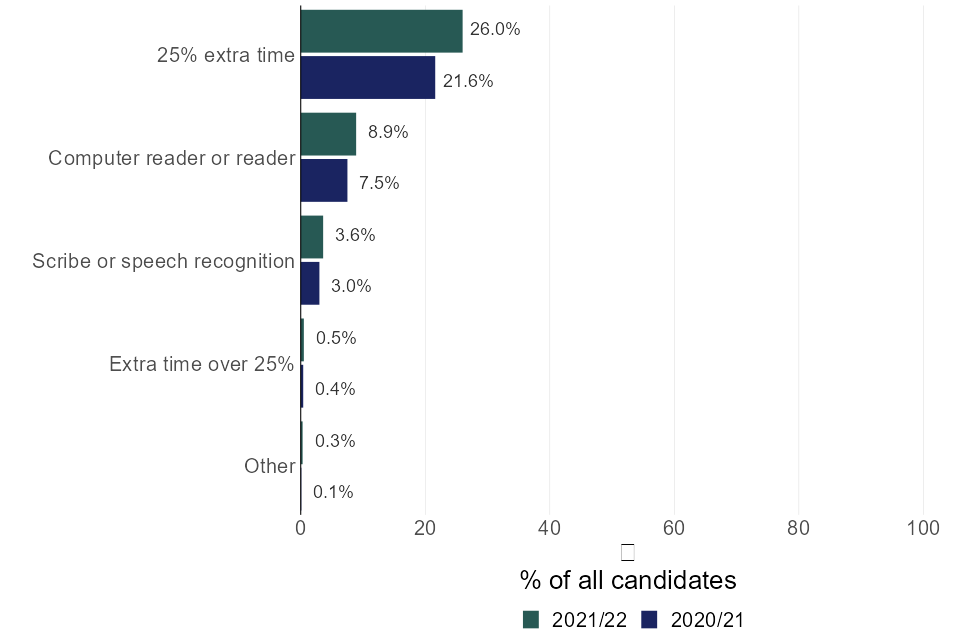
| Access arrangement | % of all candidates in 2020 to 2021 | % of all candidates in 2021 to 2022 |
|---|---|---|
| 25% extra time | 21.6% | 26.0% |
| Computer reader or reader | 7.5% | 8.9% |
| Scribe or speech recognition | 3.0% | 3.6% |
| Extra time over 25% | 0.4% | 0.5% |
| Other | 0.1% | 0.3% |
25% extra time access arrangements were approved for 26.0% of all candidates taking exams in the 2021 to 2022 academic year, compared to 21.6% in the 2020 to 2021 academic year.
Computer reader or reader access arrangements were approved for 8.9% of all candidates taking exams in the 2021 to 2022 academic year, compared to 7.5% in the 2020 to 2021 academic year.
Scribe or speech recognition access arrangements were approved for 3.6% of all candidates taking exams in the 2021 to 2022 academic year, compared to 3.0% in the 2020 to 2021 academic year.
Please note that more than one type of access arrangement can be granted per candidate. From the data that we collect for this release we are unable to calculate the percentage of candidates who received access arrangements covered by the ‘All other remaining arrangements’ category.
3.4 Proportions of all approved access arrangements by centre type
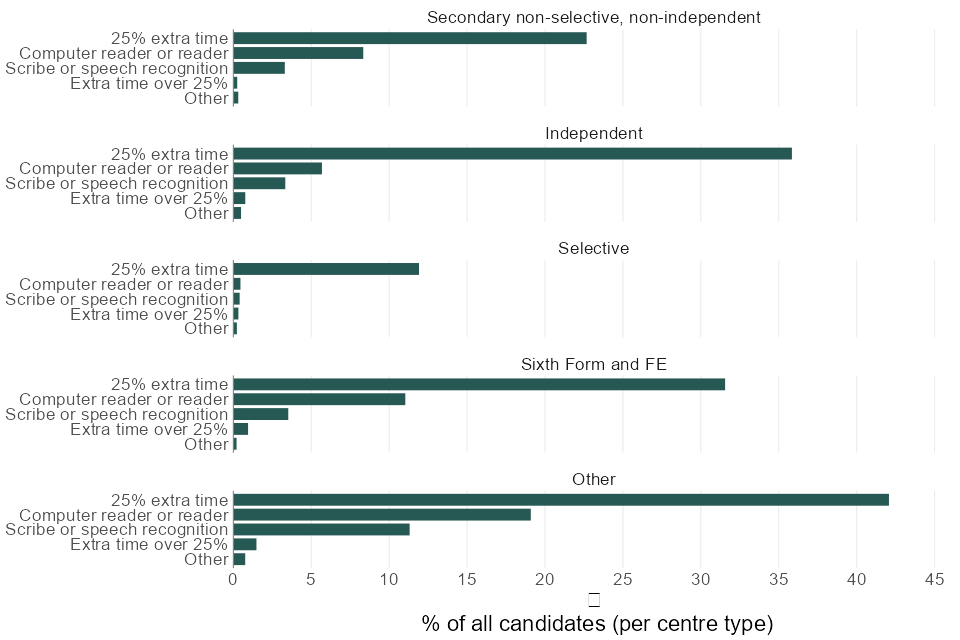
| Access arrangement | % of all candidates in Secondary non-selective, non-independent centres | % of all candidates in Independent centres | % of all candidates in Selective centres | % of all candidates in Sixth Form and FE centres | % of all candidates in Other centres |
|---|---|---|---|---|---|
| 25% extra time | 22.7% | 35.8% | 11.9% | 31.6% | 42.1% |
| Computer reader or reader | 8.3% | 5.7% | 0.5% | 11.0% | 19.1% |
| Scribe or speech recognition | 3.3% | 3.3% | 0.4% | 3.5% | 11.3% |
| Extra time over 25% | 0.2% | 0.8% | 0.3% | 0.9% | 1.5% |
| Other | 0.3% | 0.5% | 0.2% | 0.2% | 0.8% |
The most common access arrangement approved in all centre types was 25% extra time (ranging from 11.9% of candidates in Selective centres to 42.1% of candidates in Other centres).
The second most common access arrangement for all centre types was Computer reader or reader (ranging from 0.5% of candidates in Selective centres to 19.1% of candidates in Other centres).
Scribe or speech recognition was the third most common access arrangement for all centre types (ranging from 0.4% of candidates in Selective centres to 11.3% of candidates in Other centres).
The ‘Other’ centre type includes special schools, colleges of higher education, university departments, tutorial colleges, language schools, pupil referral units (PRUs), HM Young Offender Institutes (HMYOI), HM Prisons, training centres, and unknown centre types.
Please note that an individual candidate can be granted more than one type of access arrangement, meaning that individual candidates may contribute to the figures for multiple arrangement types within a centre type. From the data that we collect for this release we are unable to calculate the percentage of candidates who received access arrangements under the ‘All other remaining arrangements’ category across centre types.
4. Number of modified paper requests
Schools and colleges request modified question papers in advance of a specific exam series. Exam boards prepare modified papers for candidates with, for example, visual impairments and/or significant language comprehension disorders to allow them to demonstrate their skills, knowledge and understanding. While modified papers can be used for exams in any assessment series, Ofqual has only been reporting data on the summer exam series.
A request for a modified paper is made for each individual exam paper (whereas for the other types of access arrangements given in this release one request is made for each candidate across all exams). Therefore, an individual candidate may use multiple modified papers in a single exam series. The figures reported in this section are only for the summer exam series (whereas the rest of the data reported in this release covers the whole academic year). For these reasons, data for modified papers is presented separately from the other access arrangements in this report.
Please note, in this report we compare the numbers of requests for modified papers made for summer 2022 against summer 2019. Due to the cancellation of exams in summer 2020 and 2021 we did not collect data on modified paper requests for these series.
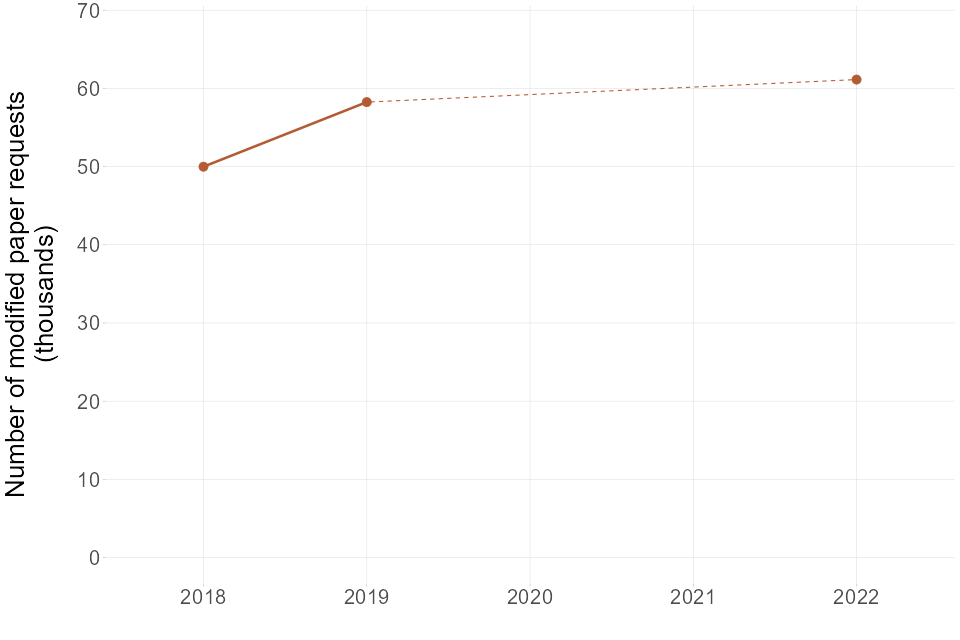
| 2018 | 2019 | 2022 |
|---|---|---|
| 49,985 | 58,245 | 61,125 |
There were 61,125 requests for modified papers in summer 2022, an increase of 4.9% compared to summer 2019.
The number of modified question papers requested for the summer 2022 exam series (61,125) was small in relation to the 16 million standard papers produced and used in the same series. However, these figures only show the number of requests made by centres for modified papers, not the total number of modified papers actually produced or used in the summer series. This is because some decisions related to modified papers are delegated to centres, meaning that formal requests are not always required. In addition, exam boards differ in how they collect the number of requests made - either at centre level or candidate level or a mixture of the two.
5. Most common types of modified paper requests
5.1 Proportions of all modified paper requested
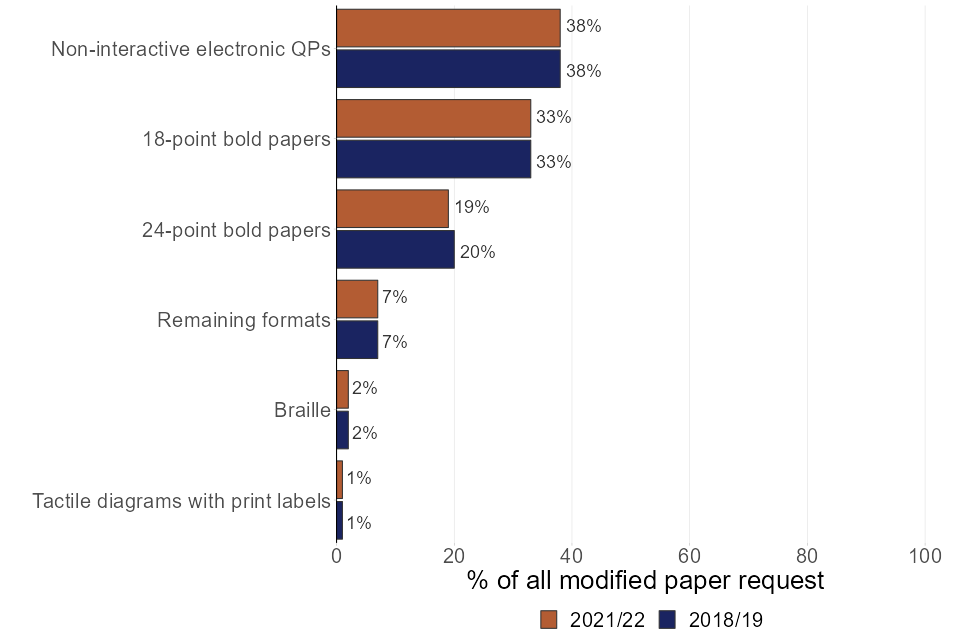
| Modified paper type | % of all approved arrangements in 2019 | % of all approved arrangements in 2022 |
|---|---|---|
| Non-interactive electronic QPs | 38 | 38 |
| 18-point bold papers | 33 | 33 |
| 24-point bold papers | 20 | 19 |
| Remaining formats | 7 | 7 |
| Braille | 2 | 2 |
| Tactile diagrams with print labels | 1 | 1 |
Non-interactive electronic question papers remain the most common type of modified paper requested.
‘Remaining formats’ includes less frequently used modified papers such as modified language, transcripts of listening test/video, and other formats (a further breakdown is given in the data tables).
5.2 Modified papers changes over time
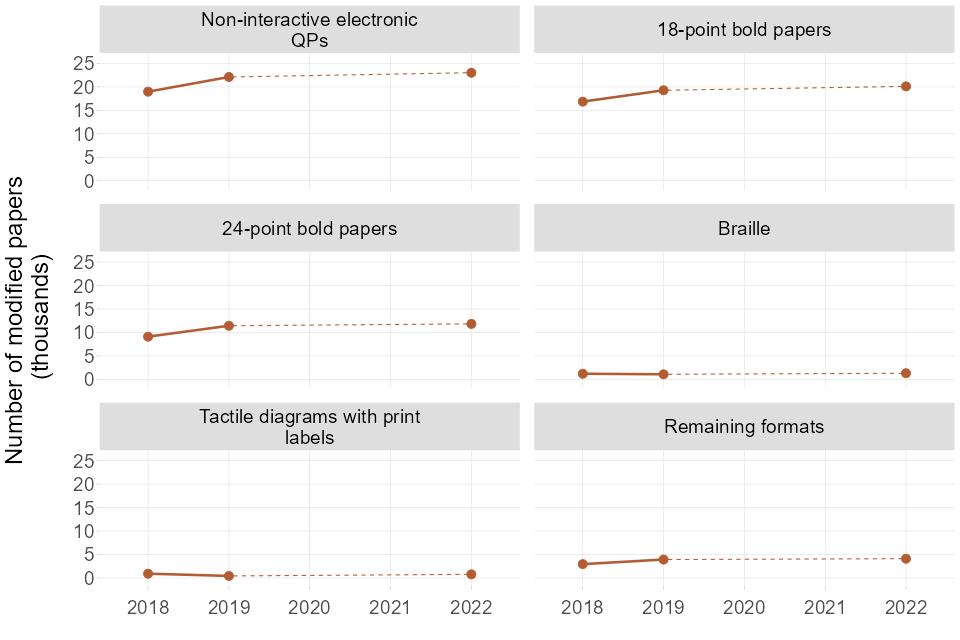
| Type of modified paper | 2018 | 2019 | 2022 |
|---|---|---|---|
| Non-interactive electronic QPs | 18,985 | 22,115 | 23,030 |
| 18-point bold papers | 16,865 | 19,285 | 20,115 |
| 24-point bold papers | 9,095 | 11,425 | 11,820 |
| Braille | 1,195 | 1,075 | 1,300 |
| Tactile diagrams with print labels | 905 | 425 | 760 |
| Remaining formats | 2,940 | 3,920 | 4,100 |
| Total | 49,985 | 58,245 | 61,125 |
Numbers for all types of requests for modified papers have risen this year compared to 2019. As per the note given above, the numbers of requests made for summer this year are compared to summer 2019 as there were no exams in summer 2020 and 2021.
6. Contextual information
In this report, Ofqual presents data on access arrangements approved for GCSE, AS and A level exams during the 2021 to 2022 academic year in England.
Access arrangements are the provisions made for students, agreed before they are assessed, to ensure that they can be validly assessed and are not unfairly disadvantaged due to a disability, temporary illness or injury or if their first language is not English. Any student with a disability as defined by the Equality Act 2010 (who has a physical or mental impairment that has a substantial and long-term negative effect on their ability to do normal daily activities) is legally entitled to reasonable adjustments, which are a form of access arrangement. Access arrangements should not be confused with post-examination adjustments to the marks of students who have not been able to demonstrate their ability in an assessment due to exceptional circumstances, such as bereavement or illness at the time of the assessment. These post-examination adjustments are covered in a separate report on special consideration. Due to the cancellation of summer exams in 2020 and 2021, there is no 2020 or 2021 release of the special consideration report.
Any students entered for GCSE, AS or A levels who meet the exam boards’ eligibility criteria can receive an access arrangement. Individual students may require more than one form of access arrangement. According to JCQ guidelines, once granted, an access arrangement for a disabled student will apply for up to 26 months, although applications based on temporary conditions will last for one exam series only. In the 2020 to 2021 academic year, applications that had expired prior to, during or after the summer 2020 examination series were extended until the autumn 2020 examination series.
While other types of arrangement can be requested without needing exam board approval, the data in this release only cover those arrangements granted through JCQ’s Access Arrangements Online system (detailed in JCQ guidelines).
In this release, all figures are rounded to the nearest 5 to ensure confidentiality of the data. Further information on this release is available in the background information as well as the data tables accompanying this report.
Figures for modified papers for summer 2020 and 2021 are not presented in this release. No GCSE, AS and A level exams took place in summer 2020 and 2021 due to the COVID-19 pandemic and therefore data on modified papers has not been collected.
7. User feedback
We welcome your feedback on our publications. Should you have any comments on this statistical release and how to improve it to meet your needs please contact us at data.analytics@ofqual.gov.uk.
Head of profession: Nadir Zanini

